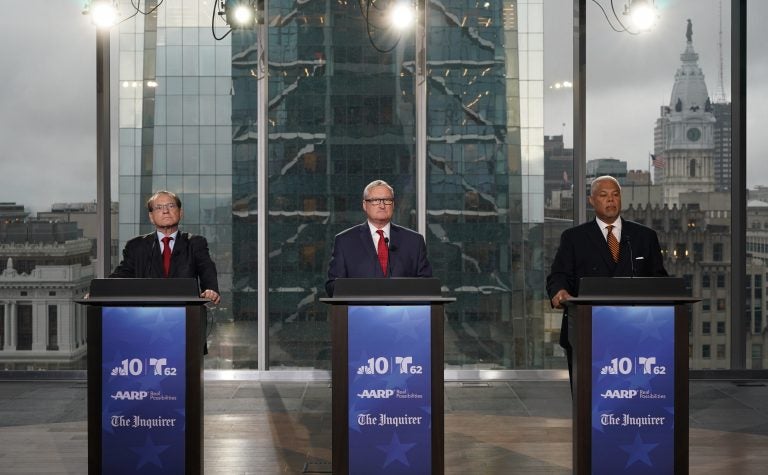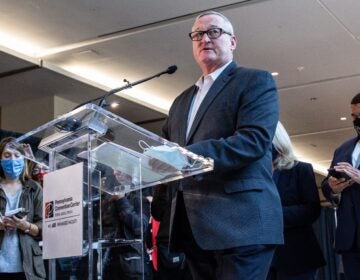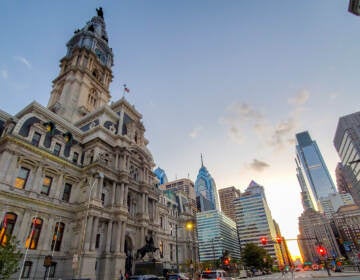Philly candidates for mayor spar on crime, poverty in only televised debate
As Kenney faced off against state Sen. Anthony Williams and former City Controller Alan Butkovitz, the race showed its first signs of a pulse.
Listen 1:47
Democratic candidates for mayor Alan Butkovitz, left, state Sen. Anthony Hardy Williams, right, and Philadelphia Mayor Jim Kenney, center, participate in a live televised debate, Monday May 13, 2019, at the Comcast Technology Center in Philadelphia. NBC10 Photo/ Joseph Kaczmarek, Pool
This story originally appeared on Billy Penn.
One week out from the May 21 primary election, Philadelphia Mayor Jim Kenney sparred with his two Democratic challengers in the only televised debate of the race. The evening began as a measured policy battle and devolved into a political catfight.
As Kenney faced off against state Sen. Anthony Williams and former City Controller Alan Butkovitz, the race showed its first signs of a pulse. The three Democrats got combative over rising homicides to climbing real estate taxes to the proposed supervised injection site. One of the only things they didn’t quibble about was their combined opposition to President Donald Trump’s attacks on Philly’s “sanctuary city” status.
Both Butkovitz and Williams tried to distinguish themselves from the mayor, while running on numerous identical proposals like ending the sweetened beverage tax and abolishing “stop-and-frisk” policing. The hour-long debate, hosted by NBC10 and Telemundo 62, also brought accusations that Kenney is controlled by powerful political interests.
Kenney takes heat on homicides, poverty
Much of the debate revolved around the three issues that most concern voters, according to a recent Inquirer poll: crime, poverty and education.
On the city’s rising homicides, Butkovitz laid the blame most heavily at the feet of District Attorney Larry Krasner. He said Krasner’s criminal justice policies send a message to violent criminals that they can walk away with limited repercussions. Butkovitz proposed returning to mandatory minimum sentences.
Williams, who exuded the most confidence throughout the night, didn’t shy away from dropping extremely ambitious campaign promises. He at one point said he could cut Philadelphia’s persistent poverty rate “in half” over the course of eight years as mayor. (Williams has been a lawmaker in Harrisburg for more than two decades.)
For the first half of the debate, Kenney, who vacillated between passionate defense and hurried, sputtering responses, mostly defended his administration’s accomplishments to date on these issues.
There was a lot of quibbling
Williams repeatedly characterized Kenney’s administration as a deflecting its role in various problems, and “paying lip service and not substance” to solutions.
After Kenney explained his support for and simultaneous concern about opening the city’s first supervised injection site where drug users can shoot up under medical supervision, Butkovitz was ready with a one-liner: “classic Jim Kenney: both for it and against it at the same time.”
Neither candidate passed up an opportunity to pick apart the incumbent’s responses — often at the expense of actual policy debate.
By the end, all three candidates took turns being both combative and defensive, skipping over the next policy question to hammer home a previous point. At one point, Butkovitz made a seemingly personal jab at the political views of one of the debate moderators, Inquirer opinion editor Sandra Shea, after Shea urged Butkovitz to stick to a direct answer to the question.
Bloomberg and Johnny Doc
Who controls the mayor, politically speaking? That’s one question Kenney’s opponents tried to plant in the minds of viewers.
Early on, Williams brought up a recent $1 million infusion to a pro-Kenney group from former New York City mayor Michael Bloomberg. Williams described Bloomberg as the “answer” behind some of Kenney’s unpopular policy decisions.
“[Bloomberg] loves stop and frisk and he loves the soda tax, that’s why we have it,” Williams asserted.
Butkovitz went after another ally of the mayor: John “Johnny Doc” Dougherty, the politically-connected labor leader who was indicted on federal corruption charges earlier this year. The union Dougherty leads, Local 98 of the International Brotherhood of Electrical Workers, has been one of Kenney’s most formidable political backers. The Local 98 PAC recently made a $200,000 contribution to a different super PAC formed this year to run pro-Kenney ads.
‘I’m Anthony Hardy Williams and I’m running for mayor’
For most of the night, Kenney did not respond to repeated jabs about his political funders — but he’d apparently met his limit. With eight minutes left in the hour, Kenney took a question about whether voters were better off under his watch.
“Mr. Butkovtiz was fired by voters for not doing his job,” Kenney said. (Butkovitz was unseated in the 2017 primary by now-Controller Rebecca Rhynhart.)
Defending himself, Butkovitz brought up Dougherty again. Kenney then interrupted to note that both Butokovitz and Williams had also taken hefty contributions from Doughterty’s unions over the years.
“You sit here and listen to all this but the hypocrisy is unbelievable,” Kenney said.
It eventually got awkward. In a moment of silence, Williams seized on the clash between his two rivals to make a lighthearted joke. “I’m Anthony Hardy Williams and I’m running for mayor,” he said.
Did the debate change anything?
As the one and only televised debate, Monday night’s back-and-forth was the challengers’ big chance to reach the largest number of voters, and they spent a considerable amount of time bickering with the current mayor.
Williams later called the spat between his two rivals “embarrassing.” He also spent much of the debate repeating his campaign website domain — WilliamsIn2019.com — which is good because you can’t find his campaign in a Google search.
The feuding stands outs in a mayoral campaign season that has been marked by excessive sleepiness. Sure, no incumbent mayor has lost their second term re-election in seven decades. But Kenney has been accused of “flying at 30,000 feet.” He recently referred to his two opponents as “annoying gnats.”
At a press scrum after the debate where Williams and Butkovitz took specific questions from reporters. Kenney was nowhere to be seen.
Amid the jabs and counter-punches, voters looking to hear the challengers’ messages for change may have gotten lost in the noise.
WHYY is your source for fact-based, in-depth journalism and information. As a nonprofit organization, we rely on financial support from readers like you. Please give today.




